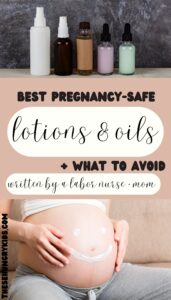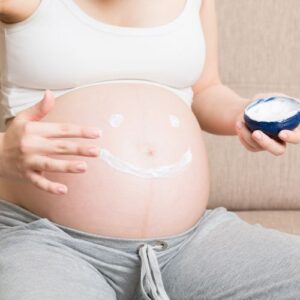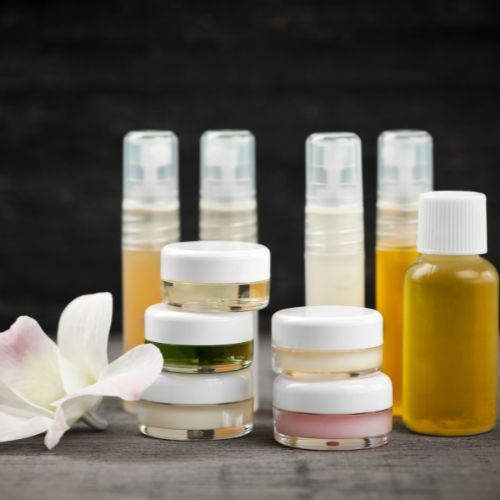Pregnancy is a beautiful journey filled with anticipation, joy, and a few challenges along the way—including changes to your skin. As your belly grows, it is not uncommon to experience itching, stretching, and dry skin. It’s essential to prioritize skincare that is safe, nourishing, and effective.
One key aspect of prenatal skincare is choosing the right lotion or oils to keep your skin hydrated and comfortable throughout pregnancy. In this guide, we’ll explore the best lotions to use during pregnancy and address common concerns such as stretch marks, dryness, and sensitivity.
As a labor and delivery nurse and mom to three, I have tried and tested many different products. This article will help guide you to the best products and ingredients to use during pregnancy and which skincare ingredients to avoid.

This post contains affiliate links for your convenience. If a product is purchased using a link from this page, I may earn a small commission at no additional cost to you. This article does not contain medical advice and is intended for entertainment purposes only. If you are concerned about your health, please seek medical advice from your personal healthcare provider.
Understanding Pregnancy Skin Changes
Before delving into specific product recommendations, let’s dive into how pregnancy can impact your skin. Hormonal fluctuations, increased blood volume, and stretching of the skin to accommodate your growing belly can lead to skin changes. You may find your skin feeling more sensitive and itchy and may notice stretch marks developing. Hormonal changes can influence the production of sebum, leading to acne flare-ups for some expectant mothers.
Choosing Safe and Effective Lotions For Pregnancy
When selecting lotions during pregnancy, it’s essential to prioritize safety for both you and your baby. Opt for products that are free from potentially harmful ingredients such as parabens, phthalates, formaldehyde, and artificial fragrances. Look for lotions that are labeled as pregnancy-safe or formulated specifically for expectant mothers. Steering for more natural ingredients may help those that have noticed more sensitivity when becoming pregnant.
Additionally, consider the following factors when choosing a pregnancy lotion:
- Hydration: Pregnancy can exacerbate skin dryness, so opt for lotions that provide deep hydration to relieve discomfort and maintain skin elasticity.
- Ingredients: Look for lotions enriched with nourishing ingredients such as shea butter, cocoa butter, vitamin E, and natural oils like almond, coconut, or avocado oil. These ingredients help soothe and moisturize the skin while providing essential nutrients.
- Stretch Mark Prevention: While it’s impossible to prevent stretch marks entirely, using a lotion formulated specifically for stretch mark prevention can help minimize their appearance. Look for ingredients like collagen, elastin, and hyaluronic acid, which promote skin elasticity and resilience.
- Sensitivity: Pregnancy hormones can make your skin more sensitive, so opt for fragrance-free and hypoallergenic lotions to minimize the risk of irritation or allergic reactions.

Naturally Hydrating Ingredients
These ingredients can be used on their own, or you may find them in pregnancy lotions. These topical products are great to start using in early pregnancy, but you’ll definitely find them helpful as your belly starts growing in the second and third trimester.
- Coconut oil: the same oil you use for cooking can also be hydrating on your skin. Coconut oil is hard when you first get it from the container but will quickly warm and melt in your hands.
- Mineral oils: mineral oil can be really soothing for dry and itchy skin. Body oil like mineral oil can be used everywhere on the body, including your growing tummy.
- Jojoba oil: this oil is very light and has a great smell to it. Jojoba oil can help with hydration as well as stretch mark prevention. Jojoba oil is will definitely help your skin get that rich pregnancy glow! It is also very cost effective at under $10 per bottle.
- Sweet Almond oil: another very natural oil that is great as skincare. Sweet almond oil is thought to minimize stretch mark appearance. This product can also be used to hydrate dry hair.
- Bio-oil skincare oil: so many moms swear by Bio oil! This pink colored oil absorbs quickly and is really light and hydrating. This is a good option for those with sensitive, dry skin. It is recommended to apply to the belly twice daily to minimize stretch mark development and appearance.
- Oatmeal: one of the key ingredients in many body lotions is oatmeal. Oatmeal is known for its soothing properties and has a reputation for being anti-inflammatory and having anti-oxidant properties.
Related: Is It Safe To See A Chiropractor When Pregnant?
Best Lotions For Pregnancy
These lotions all have pregnancy-safe ingredients and have raving product reviews. These skin care products are generally considered safe for a pregnant woman, but always consult your own medical professionals if you have concerns or questions.
Earth Mama Belly Butter

Earth Mama Belly Butter is a natural and organic option for expecting mothers seeking a gentle yet effective solution for dry, stretching skin. With an ingredient list including organic herbs and oils, including shea butter, aloe vera, and calendula extract, this belly butter provides soothing relief for itchy, irritated skin. It is my personal favorite belly butter. I love how easily it spreads and leaves my skin feeling so soft and smooth.
The fragrance-free and dermatologist-tested formula is safe for sensitive skin and free from synthetic fragrances, parabens, and artificial preservatives. Earth Mama has a whole line of organic, natural, and highly effective products for pregnancy, postpartum, and baby!
Badger Belly Butter
Formulated specifically for expectant mothers, Badger Belly Butter is an organic and nourishing option for preventing stretch marks and soothing dry, itchy skin. With ingredients like Vitamin E, coconut oil, cocoa butter and calendula, this rich body butter provides intense hydration while promoting skin elasticity. This formula is gentle on sensitive skin, making it great for daily use throughout pregnancy. It is USDA certified organic and petrolatum-free.
Palmer’s Cocoa Butter Formula Massage Lotion for Stretch Marks
My personal favorite, Palmer’s Cocoa Butter Formula is a trusted name in skincare, and their Massage Lotion for Stretch Marks is a popular choice among pregnant women. Infused with pure cocoa butter, vitamin E, collagen, and elastin, this lightweight lotion helps improve skin elasticity and reduce the appearance of stretch marks.
The non-greasy formula absorbs quickly, leaving your skin feeling soft, smooth, and deeply hydrated. It has a deliciously cocoa smell to it and goes on so smoothly!

Mustela Stretch Marks Prevention Cream
Mustela is a leading brand in baby and maternity skincare, and their Stretch Marks Prevention Cream is a top choice for pregnant women worldwide. Clinically proven to reduce the appearance of stretch marks, this hypoallergenic cream is formulated with avocado peptides, shea butter, and beeswax to nourish and hydrate the skin. The lightweight and fast-absorbing formula is safe for both mom and baby, making it ideal for daily use from the first trimester onwards. This is one of the best stretch mark creams on the market!
Honest Organic Belly Balm
Honest Organic Belly Balm offers a luxurious and organic solution for pampering your growing belly during pregnancy. Made with a blend of organic shea butter, olive oil, and tamanu oil, this belly balm provides intense moisture and nourishment to help prevent stretch marks and relieve dryness. The fragrance-free and hypoallergenic formula is gentle on sensitive skin and free from synthetic fragrances, parabens, and phthalates.
Related: Everything You Really Need to Know About Being Pregnant
Skincare To Avoid While Pregnant
While most skincare products are safe to use during pregnancy, there are certain ingredients that expectant mothers may want to avoid due to potential risks to the baby or concerns about their impact on hormonal balance. Some of these products are considered endocrine disruptors while others may potentially contribute to congenital malformations. While it is important to avoid harsh chemicals, it may be especially important during pregnancy while your body is going through such a significant change.
If you notice your skin is changing due to switching out products or just due to skin conditions of pregnancy, definitely get some expert advice from a board-certified dermatologist. They are the best to given
Here are some skincare products and ingredients to steer clear of during pregnancy:
- Retinoids (Retinol, Retin-A, Tretinoin): Retinoids are vitamin A derivatives commonly found in anti-aging creams, acne treatments, and prescription medications. While topical retinoids are highly effective in improving skin texture and reducing wrinkles, oral intake of high doses of vitamin A has been linked to birth defects. While the risk of birth defects from topical retinoid use is still debated, it’s best to err on the side of caution and avoid using products containing retinoids during pregnancy.
- Salicylic Acid: Salicylic acid is a beta hydroxy acid (BHA) commonly used in acne treatments and exfoliating skincare products. While topical use of low concentrations of salicylic acid is generally considered safe during pregnancy, high doses, such as those found in professional chemical peels, should be avoided. Oral intake of salicylic acid, such as aspirin, should also be limited during pregnancy due to potential risks of bleeding and other complications.
- Hydroquinone: Hydroquinone is a skin-lightening agent used to treat hyperpigmentation and melasma. It is commonly used to treat uneven skin tone. While there is limited research on the safety of topical hydroquinone during pregnancy, some studies suggest a possible association with adverse effects on fetal development. As a precaution, it’s best to avoid using hydroquinone-containing products during pregnancy and opt for alternative treatments for hyperpigmentation, such as vitamin C serum or azelaic acid.
- Formaldehyde: Formaldehyde and formaldehyde-releasing preservatives (such as DMDM hydantoin, imidazolidinyl urea, and diazolidinyl urea) are commonly found in skincare products, including shampoos, body washes, and nail polishes. These preservatives help prevent microbial growth and prolong shelf life. However, exposure to high levels of formaldehyde has been linked to adverse health effects, including respiratory irritation and cancer. To minimize exposure, pregnant women should avoid products containing formaldehyde-releasing preservatives.
- Chemical Sunscreens (Oxybenzone, Avobenzone, Octinoxate): Chemical sunscreens work by absorbing UV radiation and converting it into heat, but some ingredients, such as oxybenzone and octinoxate, have raised concerns about their potential hormonal effects. While the evidence is inconclusive, some studies suggest that these chemicals may disrupt hormone levels and have adverse effects on fetal development. Pregnant women may opt for mineral-based sunscreens containing zinc oxide or titanium dioxide, which provide broad-spectrum protection without the potential hormonal concerns.
- Fragrance: Fragrances are commonly used in skincare products to enhance their scent, but they can contain a mixture of potentially harmful chemicals, including phthalates, which have been linked to adverse reproductive and developmental effects. To minimize exposure to synthetic fragrances, pregnant women may choose fragrance-free or naturally scented skincare products.
- Essential oils: while most essential oils are considered to be pregnancy safe, there are some to avoid. Essential oils like clary sage, rosemary, juniper berry, and pennyroyal are thought to stimulate uterine contractions. Check the ingredients list of your skincare and beauty products to make sure they are considered pregnancy-safe.

It’s important to note that everyone’s pregnancy skin is different, and what works for one person may not work for another. If you have any concerns about specific skincare products or ingredients during pregnancy, it’s always best to consult with your healthcare provider for personalized advice and recommendations. Additionally, opting for gentle, pregnancy-safe skincare products and maintaining a healthy skincare routine can help promote healthy, glowing skin throughout pregnancy and beyond.
By choosing the right lotion, you can nourish, hydrate, and protect your skin while addressing common concerns such as stretch marks, dryness, and sensitivity. Whether you prefer rich belly butters, lightweight lotions, oils, or organic formulas, there are plenty of safe and effective options available to support you on your path to motherhood.

